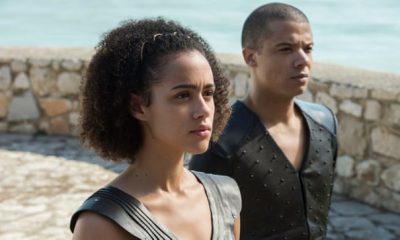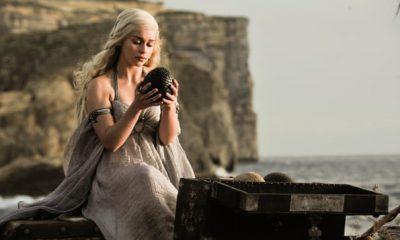‘There are no black people on Game of Thrones’: why is fantasy TV so white?


By season five, Daenerys has bagged herself a black friend (ex-slave Missandei, played by former Hollyoaks actor Nathalie Emmanuel) and has taken her conquering/liberating mission to Slaver’s Bay where she is hailed as “mhysa” (mother) by the freed slaves. We have also been introduced to the Dornish, another dusky ethnic group from a distant land who are defined by hyper-sexualised and aggressive behaviour; you needn’t be a dedicated student of Edward Said to decipher the creeping orientalism in these plot lines. As Dr David Wearing, an international relations expert and Game of Thrones fan says, “One episode [season three’s Mhysa] ends with the blond, white Daenerys being borne aloft in gratitude by a sea of faceless people of colour, at which point we’re scarcely in the realms of interpreting subtext.”

In 2017, all this became an official talking point when GoT’s co-creators, Benioff and Weiss, announced that their next project would be Confederate, an alternative history drama, in which the south won the American civil war and slavery never ended. The announcement was met with near-instantaneous social-media anger from activists including #OscarsSoWhite creator April Reign, Ta-Nehisi Coates and Roxane Gay, who described it as “slavery fan fiction”. The project has since been delayed indefinitely.


Although fans with a shaky understanding of medieval Europe have often claimed otherwise, Game of Thrones is fantasy, not history. The shape of its world is limited only by the imaginations of its creators and – perhaps more so – its viewers. That is not to say it doesn’t draw on past traditions. “Tolkien and CS Lewis were two of the largest influencers of modern English-language fantasy,” says Ebony Elizabeth Thomas, associate professor at the University of Pennsylvania and author of The Dark Fantastic: Race and the Imagination from Harry Potter to the Hunger Games. “Both [Tolkien and Lewis] were born when the British empire was at its height, and the cartographies of their imagination were influenced accordingly. Racism in storytelling was baked into the world they came of age in; speculative fiction is almost always commenting on the contemporary concerns of a society.”

What if we do want to get at those deeper assumptions? Is it even possible? Thomas sees “the project of emancipating the dark fantastic” as her favourite genre’s greatest challenge. “Fantasy is created from the depths of a creative’s imagination … It is a very vulnerable thing to do and, thus, fantasy writers are protective of their creations. That’s understandable. But the act of ‘mythopoesis’ – making your own myths – is one that requires much thought. And still you may not see everything.” There’s a reason why some of George RR Martin’s fantasy successors (Keira Drake, Laurie Forest, Kosoko Jackson) have recently been subject to Confederate-esque online backlash from early readers regarding “racist” tropes in their work. “We can have the best of intentions, but unless we’re thinking deeply about the fantasy worlds that we build, we will re-inscribe the cartographies of the known world into our stories,” says Thomas.

Maybe we wouldn’t want to completely detach GoT from our messy, postcolonial reality, even if it were possible. “The beautiful part about the show is that it is reflective of the real world,” says Michael Harriot, columnist for Afrocentric online magazine the Root and co-host of YouTube fan show Dem Thrones. “Daenerys is basically the embodiment of white privilege. She is inches away from becoming the powerful woman in the world simply because someone gave her some dragons at birth.


